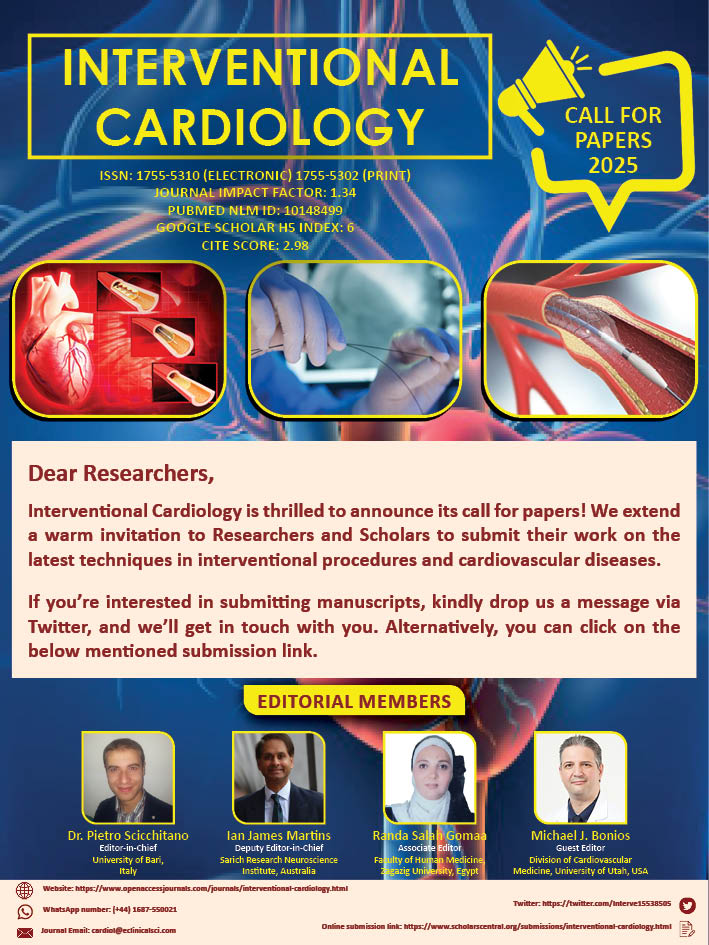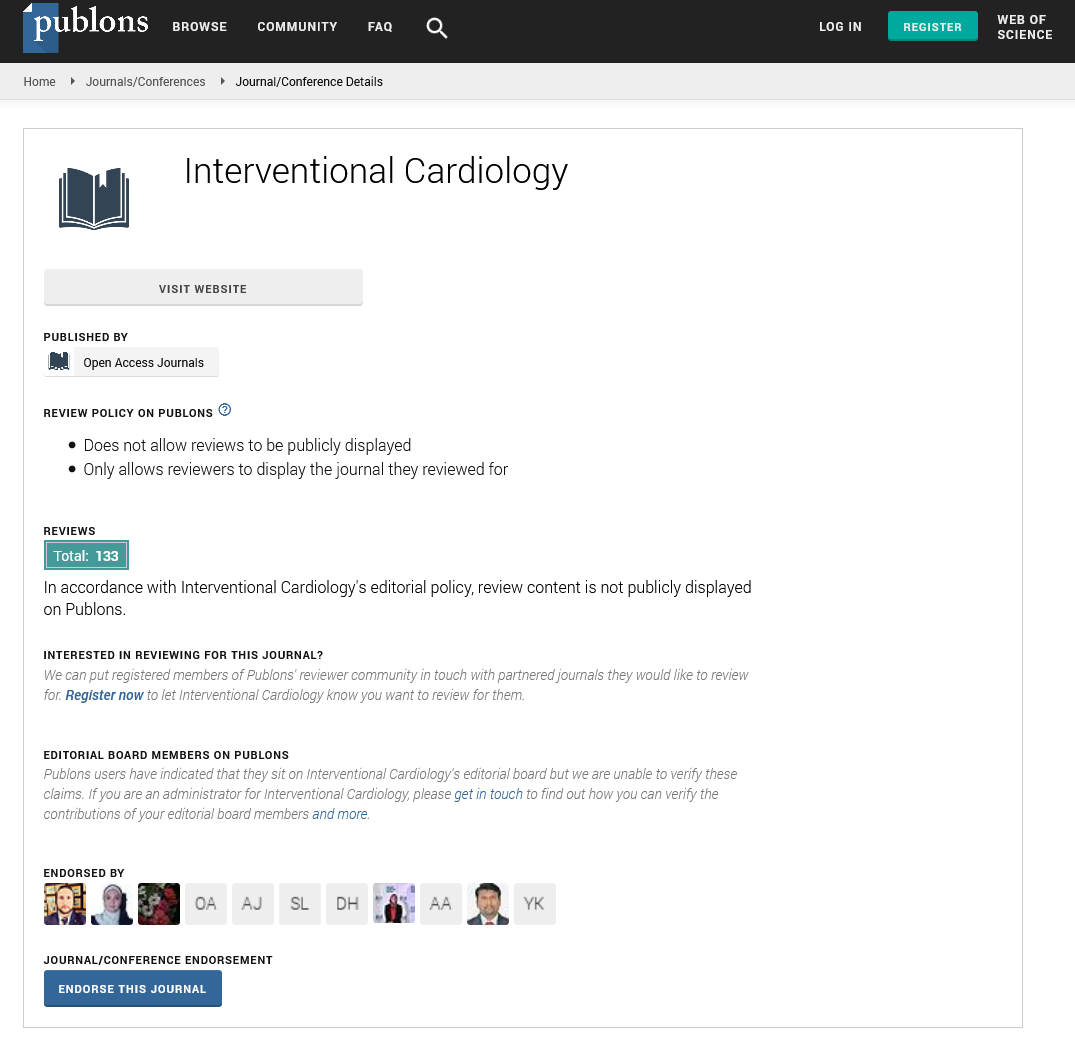Special Issue

-

Dr. Renxi Li, MD (Lead Guest Editor)
Doctor of Medicine, The George Washington University, United States of America

Dr. Ronny Munoz Acuna, MD (Supporting Guest Editor)
Department of Cardiothoracic Anesthesia and CT ICU, Yale School of Medicine, United States of America
We are honored to have a panel of distinguished experts in the field of Advancements in Cardiovascular Pharmacology and Cardiac Health as guest editors for this special issue:
Contact Information
For inquiries regarding the special issue, please contact this email ID: cardiol@eclinicalsci.com
WhatsApp number: (+44) 1687-550021About Special Issue
Cardiovascular Diseases (CVDs) remain the leading cause of mortality worldwide, necessitating on-going research and development in the field of cardiovascular pharmacology and cardiac health. This special issue aims to explore the latest advancements in the pharmacological treatment of cardiovascular conditions and innovations in cardiac health management. We invite researchers, clinicians, and experts in the field to contribute original research articles, comprehensive reviews, and insightful case studies that highlight novel therapeutic approaches, drug development, and strategies for improving cardiac health.
Scope and Topics
The special issue will cover a broad range of topics, including but not limited to:
- Novel Pharmacological Agents:
- Development and clinical trials of new drugs for the treatment of heart failure, hypertension, arrhythmias, and other cardiovascular conditions.
- Mechanisms of action and pharmacokinetics of emerging cardiovascular drugs.
- Personalized Medicine in Cardiology:
- Genetic and biomarker studies for individualized treatment plans.
- Pharmacogenomics and its application in cardiovascular therapeutics.
- Innovations in Drug Delivery Systems:
- Advances in nanotechnology and targeted drug delivery for cardiac conditions.
- Controlled release systems and their impact on treatment efficacy.
- Non-Pharmacological Interventions:
- Integrative approaches combining pharmacology with lifestyle modifications, dietary interventions, and exercise.
- The role of digital health and wearable technology in monitoring and managing cardiac health.
- Cardiac Regeneration and Repair:
- Stem cell therapy and regenerative medicine in the treatment of myocardial infarction and other cardiac injuries.
- Tissue engineering and biomaterials for cardiac repair.
- Clinical Trials and Case Studies:
- Results from recent clinical trials evaluating new cardiovascular drugs and treatments.
- Case studies illustrating a successful application of novel therapeutic strategies.
- Pharmacovigilance and Safety:
- Post-marketing surveillance of cardiovascular drugs.
- Strategies for minimizing adverse effects and drug interactions in cardiovascular therapy.
- Preventive Cardiology:
- Strategies for the prevention of cardiovascular diseases through pharmacological and non-pharmacological means.
- The role of public health initiatives and policies in promoting cardiac health.
Submission Guidelines
Manuscripts should be prepared according to the journal’s guidelines and submitted through the online submission system. Each submission will undergo a rigorous peer-review process to ensure the highest quality of published content. Authors are encouraged to present original research, innovative methodologies, and comprehensive reviews that contribute to the understanding and advancement of cardiovascular pharmacology and cardiac health.
Submit your manuscripts through Online Submission System or directly accepted by Editorial Office at manuscripts@openaccessjournals.com
Deadline for Submissions: September 30th 2024.
We look forward to receiving your valuable contributions and to advancing the field of cardiovascular pharmacology and cardiac health through this special issue.
About the Lead Guest Editor (Dr. Renxi Li, MD)
Education
- Doctor of Medicine
- Graduate Certificate in Clinical Research Practice
- Scholarly Concentration in Clinical and Translational Research
Research Experiences
Research Assistant | PI: Stephen J Huddleston, M.D., PhD | Division of Cardiothoracic Surgery, Department of Surgery, University of Minnesota Medical School | Minneapolis, MN
- Constructed the aortic surgery institutional database from the University of Minnesota for surgical outcomes research
- Clinical outcome research on aortic dissection surgery, coronary revascularization, and aortic and valve replacement using the National Inpatient Sample database
- Initiated clinical study on characterizing Left Internal Mammary Artery (LIMA) conduit used in coronary artery bypass graft surgery using micro-computerized tomography (CT) and optic CT with the Visible Heart laboratories to correlate pre-operative patients’ characteristics and surgical outcomes
Research Assistant | PI: Bharat Ranganath, M.D. | Department of Plastic Surgery, The George Washington University Medical Faculty Associate | Washington, D.C.
- Investigated factors that predicted readmission following plastic surgery and the effect of COVID in readmission using the American College of Surgeons National Surgical Quality Improvement database
Research Assistant | PI: Homa Ahmadzia, M.D., MPH | Department of Obstetrics & Gynecology, The George Washington University Medical Faculty Associate | Washington, D.C.
- Investigated racial disparities and geographic factors in the rate of postpartum hemorrhage and severe maternal morbidity using National/Nationwide Inpatient Sample database
Research Assistant | PI: Babak Sarani, M.D., Susan Kartiko, M.D., PhD, Jordan Estroff, M.D. | Department of Trauma and Acute Care Surgery, The George Washington University Medical Faculty Associate | Washington, D.C.
- Redefine age of 55 as high mortality risk in ground level falls Trauma Quality Improvement Program database
- Determine risk factors for amputation following severe lower extremity limb injury in TQIP
- Examine the trend of acuity and complication of GSW (gunshot wound) in TQIP
Research Assistant | PI: Brett Shook, Ph.D. | Department of Biochemistry and Molecular Medicine and Department of Dermatology, The George Washington University School of Medicine and Health Sciences | Washington, D.C.
- Comprehensive guide to the angiogenic niche during early (< 3 days) acute skin inflammation using single-cell RNA sequencing (scRNA-seq)
Research Assistant | PI: Bao-Ngoc Nguyen, M.D., Anton Sidawy, M.D., MPH| Division of Vascular Surgery, The George Washington University Medical Faculty Associate | Washington, D.C.
- Clinical outcome research in vascular surgery using American College of Surgeons National Surgical Quality Improvement database and National/Nationwide Inpatient Sample
Academic Honours and Awards
2024 The Society of Thoracic Surgeons Looking to the Future (LTTF) Medical Student Scholarship | The Society of Thoracic Surgeons
- A best-in-class education and workforce development program that helps general surgery residents and medical students pursue careers in cardiothoracic surgery (30 medical students and 30 residents each year)
- Provide mentorship for the best and brightest medical students or general surgery residents in hopes of encouraging them to pursue careers in cardiothoracic surgery.
The SVS Foundation Student Research Fellowship | Society for Vascular Surgery (SVS)
-
A national fellowship award (12 every year) to further student’s education and introduce the student to the application of rigorous scientific methods to clinical problems and underlying biologic processes important to patients with vascular disease
-
Awarded project: a comprehensive guide to the angiogenic niche during early acute skin inflammation using single-cell RNA sequencing
David E. Rogers Student Fellowship Award for Medical and Dental Students | New York Academy of Medicine (NYAM)
- A national fellowship (5 each award year) that enriches the educational experiences of medical and dental students through projects that bear on medicine and dentistry as they contribute to the health of communities, and address the human needs of underserved or disadvantaged patients or populations
- Awarded project: An Extensive Retrospective Analysis on The Interactive Effect of Socioeconomic Status and Patient Location on Vascular Surgery Outcomes
About The Supporting Guest Editor (Dr. Ronny Munoz Acuna, MD)
Education & Training
Fellowship: Massachusetts General Hospital / Harvard Medical School (2022)
Fellowship: Beth Israel Deaconess Medical Center / Harvard Medical School (2021)
Resident: Beth Israel Deaconess Medical Center / Harvard Medical School (2020)
Intern: Metrowest Medical Center/Tufts University (2017)
Fellowship: Universidad de Costa Rica (2016)
Resident: Universidad de Costa Rica (2014)
BSc: Universidad de Costa Rica
MD: Universidad de Costa Rica (2009)
Board Certifications
Board Certification: American Board of Anesthesiology, Critical Care Medicine (Anesthesiology) (2021)
Board Certification: American Board of Anesthesiology, Anesthesiology (2021)
Professional Service
Organization
Role
Date
Society of Critical Care Anesthesiologists (SOCCA)
Research Committee
2021-2025
Society Critical Care Medicine-Northeastern Chapter
Special Board Representative
2021-2023
- Novel Pharmacological Agents:

